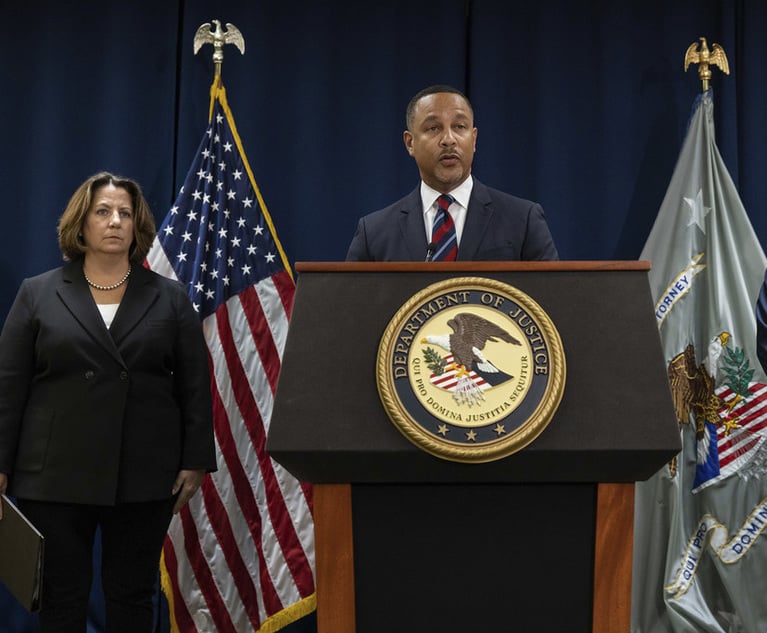Compliance Hot Spots: 'Nervousness' for Companies Over New Forced Labor Law + Lawyer Exodus from SEC + Akin Gump Reps Ex-Oath Keeper Before Jan. 6 Committee
A new U.S. law cracking down on forced labor in the Xinjiang region of China poses major compliance obstacles, according to attorneys focusing on supply chain issues and human rights.
July 13, 2022 at 05:36 PM
11 minute read
Compliance Hot SpotsWelcome to Compliance Hot Spots, our weekly snapshot on white-collar, regulatory and compliance news and trends. We're back after a one-week hiatus with the details on a new U.S. law cracking down on forced labor in the Xinjiang region of China that's creating compliance worries for importers. Plus, an analysis of what's driving lawyers to leave the SEC for private practice, and a look at the defense lawyers involved in DOJ's latest civil antitrust action. Please get in touch with tips and feedback. Contact me at [email protected] and @AGoudsward on Twitter.
 Port of Los Angeles in San Pedro, California. Credit: Ritu Jethani/Adobe Stock
Port of Los Angeles in San Pedro, California. Credit: Ritu Jethani/Adobe Stock New Law Targeting Forced Labor in China Creates 'Nervousness' for Companies
A new U.S. law meant to crack down on forced labor in the Xinjiang region of China is creating a host of new compliance worries for companies, especially importers associated with major industries in the region.
The law, which took effect last month, establishes a presumption that goods produced or manufactured in the Xinjiang region will be barred from the United States. Importers can overcome that presumption only by showing "clear and convincing" evidence the products were not created using forced labor. The act also gives the U.S. Customs and Border Patrol greater authority to detain merchandise if there is a suspected link to forced labor in Xinjiang.
The law, the Uyghur Forced Labor Protection Act, which passed with bipartisan support, was a response to years of reports of human rights abuses against the Muslim Uyghur minority in the region. The Chinese government has reportedly forced thousands of Uyghurs into internment and forced labor camps.
This content has been archived. It is available through our partners, LexisNexis® and Bloomberg Law.
To view this content, please continue to their sites.
Not a Lexis Subscriber?
Subscribe Now
Not a Bloomberg Law Subscriber?
Subscribe Now
NOT FOR REPRINT
© 2025 ALM Global, LLC, All Rights Reserved. Request academic re-use from www.copyright.com. All other uses, submit a request to [email protected]. For more information visit Asset & Logo Licensing.
You Might Like
View All
Compliance Hot Spots: GOP Eyes ESG as an Antitrust Issue + Another DOJ Crypto Seizure + Sidley Partner Jumps to Main Justice
9 minute read
Compliance Hot Spots: Lessons from Lafarge + Fraud Section Chief Talks Compliance + Cravath Lands FTC Commissioner
11 minute readLaw Firms Mentioned
Trending Stories
- 1Rejuvenation of a Sharp Employer Non-Compete Tool: Delaware Supreme Court Reinvigorates the Employee Choice Doctrine
- 2Mastering Litigation in New York’s Commercial Division Part V, Leave It to the Experts: Expert Discovery in the New York Commercial Division
- 3GOP-Led SEC Tightens Control Over Enforcement Investigations, Lawyers Say
- 4Transgender Care Fight Targets More Adults as Georgia, Other States Weigh Laws
- 5Roundup Special Master's Report Recommends Lead Counsel Get $0 in Common Benefit Fees
Who Got The Work
J. Brugh Lower of Gibbons has entered an appearance for industrial equipment supplier Devco Corporation in a pending trademark infringement lawsuit. The suit, accusing the defendant of selling knock-off Graco products, was filed Dec. 18 in New Jersey District Court by Rivkin Radler on behalf of Graco Inc. and Graco Minnesota. The case, assigned to U.S. District Judge Zahid N. Quraishi, is 3:24-cv-11294, Graco Inc. et al v. Devco Corporation.
Who Got The Work
Rebecca Maller-Stein and Kent A. Yalowitz of Arnold & Porter Kaye Scholer have entered their appearances for Hanaco Venture Capital and its executives, Lior Prosor and David Frankel, in a pending securities lawsuit. The action, filed on Dec. 24 in New York Southern District Court by Zell, Aron & Co. on behalf of Goldeneye Advisors, accuses the defendants of negligently and fraudulently managing the plaintiff's $1 million investment. The case, assigned to U.S. District Judge Vernon S. Broderick, is 1:24-cv-09918, Goldeneye Advisors, LLC v. Hanaco Venture Capital, Ltd. et al.
Who Got The Work
Attorneys from A&O Shearman has stepped in as defense counsel for Toronto-Dominion Bank and other defendants in a pending securities class action. The suit, filed Dec. 11 in New York Southern District Court by Bleichmar Fonti & Auld, accuses the defendants of concealing the bank's 'pervasive' deficiencies in regards to its compliance with the Bank Secrecy Act and the quality of its anti-money laundering controls. The case, assigned to U.S. District Judge Arun Subramanian, is 1:24-cv-09445, Gonzalez v. The Toronto-Dominion Bank et al.
Who Got The Work
Crown Castle International, a Pennsylvania company providing shared communications infrastructure, has turned to Luke D. Wolf of Gordon Rees Scully Mansukhani to fend off a pending breach-of-contract lawsuit. The court action, filed Nov. 25 in Michigan Eastern District Court by Hooper Hathaway PC on behalf of The Town Residences LLC, accuses Crown Castle of failing to transfer approximately $30,000 in utility payments from T-Mobile in breach of a roof-top lease and assignment agreement. The case, assigned to U.S. District Judge Susan K. Declercq, is 2:24-cv-13131, The Town Residences LLC v. T-Mobile US, Inc. et al.
Who Got The Work
Wilfred P. Coronato and Daniel M. Schwartz of McCarter & English have stepped in as defense counsel to Electrolux Home Products Inc. in a pending product liability lawsuit. The court action, filed Nov. 26 in New York Eastern District Court by Poulos Lopiccolo PC and Nagel Rice LLP on behalf of David Stern, alleges that the defendant's refrigerators’ drawers and shelving repeatedly break and fall apart within months after purchase. The case, assigned to U.S. District Judge Joan M. Azrack, is 2:24-cv-08204, Stern v. Electrolux Home Products, Inc.
Featured Firms
Law Offices of Gary Martin Hays & Associates, P.C.
(470) 294-1674
Law Offices of Mark E. Salomone
(857) 444-6468
Smith & Hassler
(713) 739-1250










